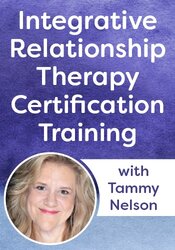How Becoming a C-IRT Can Enhance Your Practice and Client Outcomes

Helping clients build healthy and fulfilling relationships is a vital aspect of a therapist’s role. And to be effective, it's essential to have the skills and techniques that resonate with today’s clients.
An Integrative Relationship Therapy Professional certification (C-IRT) will equip you with a vast amount of knowledge and skills to confidently and effectively implement an integrative approach to couples therapy. Sex and relationship expert, author, and Evergreen advisor Dr. Tammy Nelson answers your questions about the ins-and-outs and benefits of earning your C-IRT certification.
*Please note that to maintain C-IRT certification, a renewal is required after your initial 2-year certification.
Watch the video below to learn from Dr. Tammy Nelson on why you should get certified in Integrated Relationship Therapy, what professionals this certification is for, how completing these group consultation sessions can help enhance a clinician’s practice and more.
An Integrative Relationship Therapy Professional certification (C-IRT) will equip you with a vast amount of knowledge and skills to confidently and effectively implement an integrative approach to couples therapy. Sex and relationship expert, author, and Evergreen advisor Dr. Tammy Nelson answers your questions about the ins-and-outs and benefits of earning your C-IRT certification.
What is Integrative Relationship Therapy?
Integrative Relationship Therapy (IRT) is a therapeutic approach designed to address relationship issues by combining elements from various therapeutic models. It aims to provide a comprehensive framework for understanding and improving the dynamics between individuals in a relationship, whether they are partners, family members, or colleagues.What are the core principles of IRT?
Integration of Therapeutic Models
- Eclectic Approach: IRT blends techniques and insights from different therapeutic approaches, including cognitive-behavioral therapy (CBT), psychodynamic therapy, and systemic therapy. This integration allows therapists to address a broad range of issues and adapt strategies to the unique needs of the clients.
- Flexibility: The integrative nature of IRT means that therapists can draw on a variety of methods to tackle specific relational problems, making the therapy more adaptable and personalized.
Focus on Relational Dynamics
- Systemic Understanding: IRT emphasizes the importance of understanding relationships within the context of broader systems, such as family, social, and cultural influences. It recognizes that individual issues are often interconnected with relational dynamics.
- Patterns and Communication: The therapy often focuses on identifying and altering maladaptive patterns of interaction and improving communication skills between individuals.
Holistic Approach
- Individual and Relational Factors: IRT considers both individual psychological factors and the dynamics between individuals. It looks at how personal histories, attachment styles, and emotional responses influence relationship patterns.
- Emotional and Cognitive Aspects: The therapy integrates strategies for managing emotions and changing cognitive distortions that impact relationships.
Therapeutic Techniques
- Communication Skills Training: IRT includes techniques to enhance communication, such as active listening, assertiveness, and effective expression of feelings and needs.
- Conflict Resolution: Strategies for resolving conflicts constructively are central to IRT, focusing on understanding underlying issues and finding mutually acceptable solutions.
- Emotional Regulation: Techniques for managing and expressing emotions in a healthy way are employed to improve relational interactions.
Empowerment and Collaboration
- Client Involvement: IRT emphasizes a collaborative therapeutic relationship where clients are actively involved in the process of change. This empowerment helps clients take responsibility for their role in the relationship dynamics.
- Building a Therapeutic Alliance: A strong, trusting therapeutic relationship is essential for effective therapy. IRT focuses on fostering this alliance to facilitate open communication and progress.
Assessment and Adaptation
- Relational Assessment: The therapy involves assessing the dynamics and patterns within the relationship, including communication styles, conflict resolution strategies, and emotional responses.
- Tailoring Interventions: Based on the assessment, therapists adapt interventions to address the specific issues and needs of the clients.
Criteria for Becoming a Certified Integrated Relationship Therapy Professional (C-IRT)
To become an Evergreen Certified Integrated Relationship Therapy Professional, you must have earned a minimum of a master’s degree in their profession and hold a state or national license as listed here, with all training hours and supervision requirements completed to be licensed for independent practice in the state they are licensed.*Please note that to maintain C-IRT certification, a renewal is required after your initial 2-year certification.
Watch the video below to learn from Dr. Tammy Nelson on why you should get certified in Integrated Relationship Therapy, what professionals this certification is for, how completing these group consultation sessions can help enhance a clinician’s practice and more.
Integrative Relationship Therapy Certification Training with Tammy Nelson

Join relationship expert Tammy Nelson in this certification program that’s specifically designed for today’s complex relationships. This training provides contemporary skills to work with today’s relationship dilemmas — including redefined monogamy, desire issues, lack of passion, trauma, sexual dysfunction, gender roles, infidelity, and even separation and divorce. You’ll get key interventions from today’s most effective, evidence-based approaches, so you can offer clients the intimate experiences they’ve been longing for.
Meet the Expert:
Tammy Nelson, Ph.D., is an internationally acclaimed psychotherapist, Board Certified Sexologist, Certified Sex Therapist and Certified Imago Relationship Therapist. She has been a therapist for almost 30 years and is the executive director of the Integrative Sex Therapy Institute. She started the institute to develop courses for psychotherapists as the need grew for certified, integrated postgraduate sex and couple’s therapists in a growing field of mental health consumers who need more complex interventions for their relationship needs.
Learn more about her educational products, including upcoming live seminars, by clicking here.
Learn more about her educational products, including upcoming live seminars, by clicking here.





